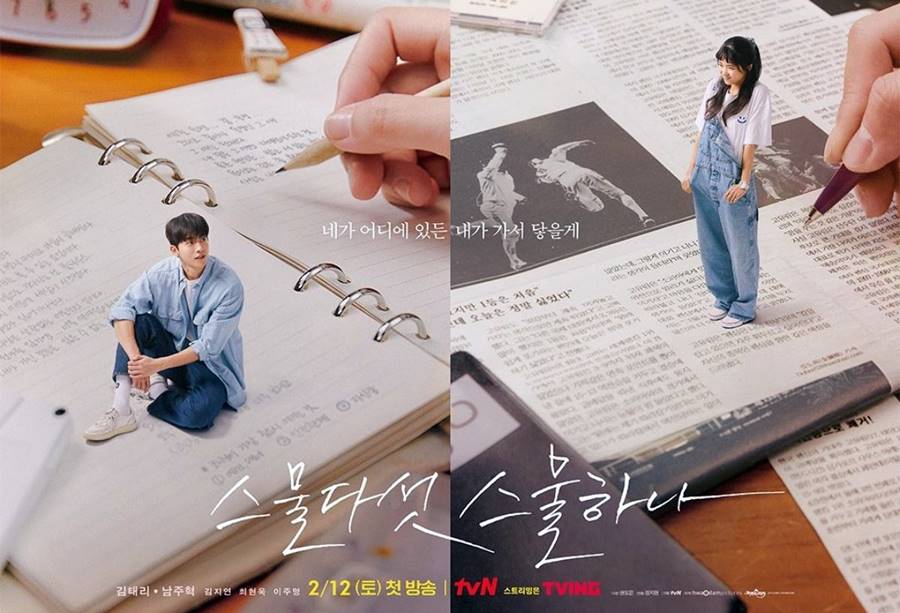
By Jae-Ha Kim
Substack
March 18, 2022
![]()
Na Hee-do (played by Kim Tae-ri)
Baek Yi-jin (played by Nam Joo-hyuk)
↑Note: Korean names denote the surname followed by the given name.
Nine minutes into the Korean series Twenty-Five Twenty-One, a high school junior named Hee-do (played by Kim Tae-ri) is on her way to school. Her mother is a news anchor, but Hee-do is oblivious to the reports about the IMF crisis and how citizens are suffering financial losses. She observes protestors on the street, but doesn’t digest their words. As she blithely notes to herself, “It has nothing to do with me. It’s adult stuff. I’m just 18 and too young to lose anything.”
This seemingly throwaway line about her age is important to remember, because her youth has become a somewhat controversial topic among viewers. The series depicts a sweet friendship between Hee-do and Yi-jin (Nam Joo-Hyuk). But Yi-jin isn’t a high school classmate – he’s a 22 year old former engineering major, who had to quit college after his family filed for bankruptcy.
Age difference relationships are a dime a dozen in pop culture — especially in TV about teenagers — and they’re often presented in a way that’s problematic (ex. Aria and Ezra in Pretty Little Liars or the underage girl kissing an adult stranger in the K-drama Backstreet Rookie). Twenty-Five Twenty-One, however, does so without sexualizing the teen character, which gives the series an almost innocent vibe. Because the leads are so charming and likable, it’s easy to forget that the story starts off with a young man hanging out with a high school student. But as viewers, how do we process their friendship and likely inevitable relationship? How do we think about the ways these tropes are used to draw our attention and indirectly encourage real-life relationships that can be exploitative and inappropriate? Let’s unpack it.
Korean age vs. international age
Before we delve into the dynamics of Hee-do and Yi-jin’s relationship, it’s important to address how Korean and international ages differ. While Koreans use their legal age for official documents, traditional age is used on a social level. To use a real-life example, BTS maknae Jungkook (who has coincidentally been laughing along to the K-drama on his Instagram Story) will celebrate his birthday on September 1. Most of the world considers him to be 24 years old until he turns 25 on his birthday, since he was born in 1997. But in Korean age, he already turned 26 as of January 1, 2022.
During his campaign, South Korea’s president elect Yoon Seok-yeol addressed some of the confusion regarding how old someone is. Yoon promised that his administration would phase out the use of Korean age in favor of international age.
How old are Hee-do and Yi-jin when they meet in 1998?
There has been some confusion among viewers about how old the characters are. The age in the Netflix subtitles corresponds to what the characters verbalize as their Korean age. She is 18 in Korean age, making her legal age 16 or 17. When she illegally sneaks into a nightclub, Hee-do knows she looks underage and wants to use that to get caught so she can transfer schools. It doesn’t occur to her that getting kicked out of one school won’t necessarily land her enrollment in another. But to a somewhat reckless teenager, it seems like a good scheme.
Yi-jin, who was drinking with his friends at the club, knows she’s too young to be there. When Hee-do learns he is 22 (Korean age), she expresses shock, saying she thought he was 20 at the oldest (which would be 18/19 in Western age). She immediately begins addressing him with awkward honorifics. They are not similar-aged peers as she had assumed. Rather, he is her elder.
What is the status of their relationship?
In the beginning, they are friends who support each other and listen to each other’s problems. But by the end of the fourth episode, Yi-jin gazes at Hee-do in a way that indicates he is beginning to view her as more than just a platonic younger friend. Time passes, and around a year into their friendship, he reveals that he loves her. After soaking in his words, which she gently deflects, Hee-do tells Yi-jin she doesn’t know yet how to label what it is that they have together.
Though the scene was presented in a non-exploitative way, some viewers were disappointed that the showrunners chose to create this drama with a female character who’s a minor, rather than waiting until she had at least entered college.
The underage trope
Unfortunately, the teenager/adult pairing isn’t new to K-dramas, nor to movies and TV globally. In I Hear Your Voice, Lee Jong-Suk portrays a high school senior whose friendship with a female attorney starts off with his one-sided crush. Goblin: The Lonely and Great God explores a relationship between a 900ish immortal being and a high school senior. And Cinderella and the Four Knights also focuses on a high school student who is pursued by men in their early to mid-20s. The one thing all these series have in common is that they wait until the teenagers graduate from high school before officially coupling up.
Twenty-Five Twenty-One is no Licorice Pizza. In that U.S. film, a 25-year-old woman flashes her bare breasts at her 15-year-old friend/boyfriend without worrying much about any impropriety. “I think it’s weird I hang out with Gary and his 15-year-old friends all the time,” says Alana Kane, 25. But she continues to do so. In Twenty-Five Twenty-One, Yi-jin seems mindful of their age difference, and there is nothing sexual about their relationship. He is bemused when he becomes the third wheel on Hee-do’s date with a fencing teammate. It’s also complicated when the couple is one you want to root for. Fez and Lexi fans, for example, faced that dilemma in Euphoria season 2, since Lexi is likely 16/17, while Fez is out of high school and at least 19 years old — though the two never have a physical/sexual relationship that we see on screen.
K-drama romances generally move very slowly in depicting any amorous vignettes, so there’s almost no chance that they’ll share an illicit kiss before Hee-do comes of age. I mean, even in 2021’s Hello, Me! – where the lead couple were well into their 30s – there was no kiss until the series finale.
Twenty-Five Twenty-One
The plot synopsis for the series says that when Yi-jin is 25 and Hee-do is 21 – and bear in mind again the title refers to the characters’ Korean ages — the two will fall in love. There are six episodes left in this series, and so plenty of time for the show to set the stage for the two to begin a healthy romantic relationship. (Let’s hope that the powers that be don’t pull one of those K-drama flash forwards where years have gone by, but the status of the main characters is explained away only in the final few moments.)
We all know of someone who met the love of their life when they were a teen and their partner was a young adult – who have been together forever – and usually it’s from the days of yore. But while these relationships certainly do occur in real life – and can be enticing to see play out in a fictional story – it doesn’t mean that adults dating teenagers is ever appropriate, which is why some netizens reacted negatively to that plot aspect. Even after Hee-do turns 18 (international age), the optics of seeing a student wearing a high school uniform hang out with a young man dressed in a suit for work is iffy. When writers create these kinds of stories, they appear to be utilizing a titillating trope to grab viewers’ attention.
Would the thrust of Twenty-Five Twenty-One have lost any impact if Hee-do had been a freshman in college when she met Yi-jin? No. Eighteen year olds also love graphic novels, cute guys, and sports. Ultimately, Twenty-Five Twenty-One is a beautifully-executed K-drama that gets nostalgia and friendship right, but it would’ve been just as effective if the female character had been a couple years older.
That said, what this K-drama does really well is it takes its time in developing the friendship that is the basis of the characters’ interest in each other. While we have no idea if Hee-do and Yi-jin will remain in each other’s lives past their 20s, the story we’ve seen so far leads us to believe that they were important to each other, even as adults. That could be where the real story begins.
Airdates: Sixteen episodes — each about 70-minutes long — aired on tvN from February 12 to April 3, 2022.
This piece was written in mid-March to address the age controversy. ETA a bit about the finale, which was beautiful, somewhat sad, and realistic (and left many fans disappointed).
Spoiler Alert: Hee-do and Yi-jin don’t end up together. She becomes a a world-class fencer, marries another man (never seen on camera) and raises their daughter.
As far as we know, Yi-jin has never married. Despite not having a college education, he rises to the top as an on-air reporter and anchors his own broadcast.
First loves are rarely last loves. They are memorable to a certain extent, but life goes on and your focus shifts to more important people, like your child.
As a teenager, Hee-do wrote about a glorious summer day she spent at the beach with Yi-jin and their friends. But when her daughter asks her about it, she can’t remember the details. What’s important to you in high school isn’t necessarily something that is retained through adulthood. But at that time, it’s one of the special things in your life. It’s OK to forget that era. It’s a part of growing up.
© 2022 JAE-HA KIM | All Rights Reserved






2 thoughts on ““Twenty-Five Twenty-One” (스물다섯 스물하나)”